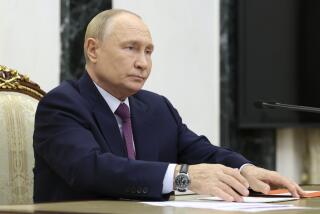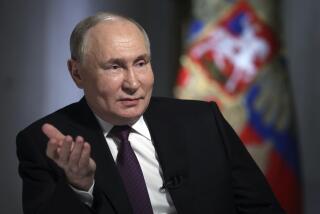Russians Warn West Against Bosnia Strikes
- Share via
MOSCOW — With rare unanimity, Russian lawmakers across the political spectrum united behind President Boris N. Yeltsin on Wednesday in warning that a NATO air strike in Bosnia would seriously damage Western relations with Russia.
Ultranationalist leader Vladimir V. Zhirinovsky delivered a near-hysterical speech to Parliament, warning that “a bombing strike on Bosnia is a declaration of war on Russia; it is the beginning of World War III.” Even devout liberals, including former First Deputy Prime Minister Yegor T. Gaidar and other prominent westernizers, warned that military action against the Serbs would be seen here as U.S.-sponsored aggression.
“It would be a disaster for Russian-American relations,” said Vyacheslav Nikonov, who once taught Russian politics at Caltech and now chairs the security and arms control subcommittee in the Duma, or lower house of Parliament.
“After you start bombing Yugoslavia, we’ll never ratify the START II treaty, never,” Nikonov said. “The treaty is in big trouble anyway, but that would destroy its chances.”
Yeltsin was sick with a cold Wednesday and was working from his countryside dacha , but a spokesman said the president was “in continuous contact” with world leaders and had been urging them not to bomb Bosnia-Herzegovina.
Foreign Minister Andrei V. Kozyrev, in a letter to U.N. Secretary General Boutros Boutros-Ghali, reiterated Russia’s opposition to the use of force. Kozyrev said Russia believes that only the secretary general, in consultation with the U.N. Security Council, has the right to order bombing, the Interfax news agency reported.
Underlining that position, Gaidar said Russia “must firmly speak against bombardment of Bosnian Serb positions in the U.N. and its Security Council.” The young economist said Russia might veto a Security Council resolution authorizing bombardment.
There was no immediate government reaction Wednesday evening to the NATO ultimatum ordering that all heavy artillery be moved 13 miles outside Sarajevo within seven to 10 days.
Earlier in the day, Interfax, quoting unnamed Foreign Ministry sources, reported that Deputy Foreign Minister Vitaly Churkin will present a Russian plan to demilitarize Sarajevo at talks in Geneva today.
The president’s spokesman described that proposal as “very sensitive” and declined to provide details.
Russia has historically supported Bosnia’s Serbs, who are brother Slavs and Orthodox Christians. Russian Slavophiles have gone to the former Yugoslav federation to fight on the Serbs’ side.
Many Russians believe the Serbs have suffered in the conflict as much as Muslims and Croats, and most reject Western suggestions that the Serbs have largely been the aggressors.
These sympathies have been reinforced by the Russian media. Though diplomatic developments receive constant coverage, Russian television over the past year has shown comparatively little daily footage of the Bosnian carnage that has so horrified Western viewers.
However, graphic footage of Sunday’s massacre in the Sarajevo marketplace has been repeatedly aired in recent days.
“Our television does not show this very often,” said Irina M. Khakamada, a lawmaker from the December 12th Union, a liberal Duma faction that has not taken a position on Bosnia. “In fact, we are not that well informed.”
The faction led by economist Grigory Yavlinsky issued a statement Wednesday warning that North Atlantic Treaty Organization involvement “in an armed conflict beyond NATO’s sphere may break the military-political balance in Europe and contradict Russia’s national interests.”
The statement also warned that lifting the arms embargo against Bosnia would draw Muslim nations into the conflict.
Democratic lawmakers especially fear that Russian nationalism and mistrust of the West will be intensified and Yeltsin’s position weakened if NATO is perceived to be bullying the Serbs.
“This will be a great gift to Zhirinovsky, the Agrarians and the Communists,” said Andranik Migranyan, a longtime Yeltsin adviser.
More to Read
Sign up for Essential California
The most important California stories and recommendations in your inbox every morning.
You may occasionally receive promotional content from the Los Angeles Times.













